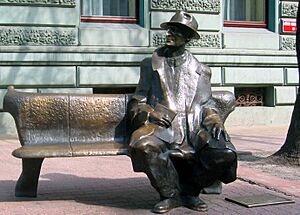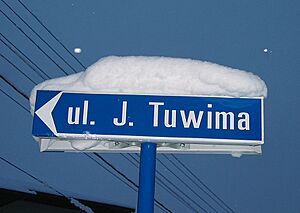Julian Tuwim facts for kids
Quick facts for kids
Julian Tuwim
|
|
|---|---|
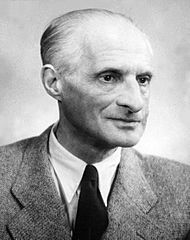
Julian Tuwim
|
|
| Born | September 13, 1894 Łódź, Congress Poland |
| Died | December 27, 1953 (aged 59) Zakopane, Poland |
| Occupation | Poet |
| Nationality | Polish |
| Literary movement | Skamander |
| Notable awards | Golden Laurel of the Polish Academy of Literature |
| Spouse | Stefania Tuwimowa (since 1919) |
| Children | Edward Tuwim-Woźniak Ewa Tuwim-Woźniak (adopted) |
| Relatives | Irena Tuwim (sister, a poet herself) Kazimierz Krukowski (cousin) |
Julian Tuwim (born September 13, 1894 – died December 27, 1953) was a famous Polish poet. He was born in Łódź, which was then part of the Russian Empire. Julian Tuwim also used the pen name "Oldlen" when writing song lyrics.
He studied law and philosophy at Warsaw University. After Poland became independent again in 1918, Tuwim helped start a group of experimental poets called Skamander. He became a very important person in Polish literature. People also loved his work for children's literature. In 1935, he received a special award called the Golden Laurel from the Polish Academy of Literature.
Contents
Julian Tuwim's Life and Work
Julian Tuwim was born into a family of Jewish background. The name Tuwim comes from a Hebrew word meaning "good ones." His parents, Izydor and Adela, gave him a comfortable childhood. He wasn't always the best student and even had to repeat a grade. In 1905, his family had to move from Łódź to Wrocław to stay safe during a time of unrest.
His Unique Poetic Style
At first, Julian Tuwim's poems were very new and exciting. They showed a lot of energy and hope, celebrating city life. He wrote about everyday things in the city, even the simple or ordinary parts. Tuwim often used everyday language, slang, and conversations in his poems.
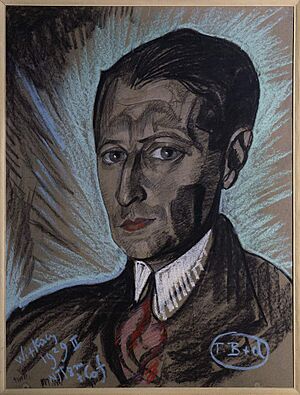
Some of his early poetry collections include Czyhanie na Boga ("In Lurking for God"; 1918) and Sokrates tańczący ("Dancing Socrates"; 1920). Later, in collections like Słowa we krwi ("Words in the Blood"; 1926), his writing became more serious. He wrote about the empty feelings of city life. He also used ideas from older styles of poetry, like Romanticism and classicism, and became a master of words.
Writing for Fun: Satire and Cabaret
From the start of his career, Tuwim enjoyed writing satire. This is a type of writing that uses humor to make fun of people's mistakes or society's problems. He wrote short funny plays and speeches for many cabaret shows. Cabarets were places where people watched comedy and musical acts.
In his poems and articles, he made fun of things like old-fashioned ideas, too much paperwork, and aggressive political ideas. His funny poem Bal w Operze ("The Ball at the Opera"; 1936) is thought to be his best satirical work.
Tuwim helped create a comedy group called Picador in 1918. He also worked with many other comedy groups as a writer or director. He wrote for a literary magazine called Wiadomości Literackie and a funny magazine called Szpilki.
One of his poems, Do prostego człowieka (To the Common Man), caused some debate. It was published in 1929. Some people on the left thought it was too peaceful, while some on the right accused him of wanting the country to disarm.
Julian's aunt was married to Adam Czerniaków, and his mother's uncle was the famous pianist Arthur Rubinstein.
Life During World War II
In 1939, when World War II started and Germany occupied Poland, Tuwim had to leave his home. He traveled through Romania to France, then to Brazil, and finally settled in the United States in 1942.
During this time, he wrote a long poem called "Kwiaty Polskie" (Polish Flowers). In this poem, he remembered his childhood in Łódź with fondness. In 1944, he also published an important statement called "My, Żydzi Polscy" (We, Polish Jews).
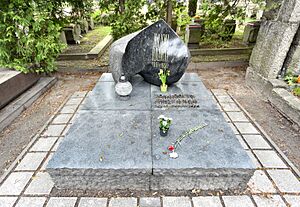
After the War: A Legacy of Words
Tuwim returned to Poland in 1946 after the war ended. He didn't write as much during this period. He passed away in 1953 at the age of 59 in Zakopane.
Even though Julian Tuwim was known for his serious poetry, he also wrote wonderful satirical works and poems for children. Some of his most famous children's poems include Lokomotywa (The Locomotive; 1938) and Rzepka (The Turnip; 1938). These have been translated into many languages. He also translated works by famous Russian poets like Alexander Pushkin.
A Russian poet named Yelizaveta Tarakhovskaya translated most of Tuwim's children's poems into Russian.
Famous Poems by Julian Tuwim
- Czyhanie na Boga (Lurking for God, 1918)
- Sokrates tańczący (Dancing Socrates, 1920)
- Siódma jesień (The Seventh Autumn, 1921)
- Wierszy tom czwarty (Poems, volume four, 1923)
- Murzynek Bambo (The little black boy, Bambo, 1923 or 1924, published 1935)
- Czary i czarty polskie (Sorcery and Deuces of Poland, 1924)
- Wypisy czarnoksięskie (The Sorcery Reader, 1924)
- A to pan zna? (And do you know this, sir?, 1925)
- Czarna msza (Black Mass, 1925)
- Tysiąc dziwów prawdziwych (A thousand true wonders, 1925)
- Słowa we krwi (Words in the blood, 1926)
- Tajemnice amuletów i talizmanów (Secrets of amulets and talismans, 1926)
- Strofy o późnym lecie (stanzas on a late summer)
- Rzecz czarnoleska (The Czarnolas affair, 1929)
- Jeździec miedziany (The brazen rider, 1932)
- Biblia cygańska i inne wiersze (The Gypsy Bible and other poems, 1932)
- Jarmark rymów (The rhyme market, 1934)
- Treść gorejąca (A Burning Matter, 1936)
- Lokomotywa (The Locomotive, 1938)
- Rzepka (The Turnip, 1938)
- Bal w Operze (A ball at the opera, 1936, published 1946)
- Kwiaty polskie (Flowers from Poland, 1940–1946, published 1949)
- Pegaz dęba, czyli panoptikum poetyckie (Oaken Pegasus, or the poetical panoply, 1950)
- Piórem i piórkiem (With pen and quill, 1951)
Music Inspired by Tuwim's Poems
Many composers and musicians have used Julian Tuwim's poems for their songs and musical pieces:
- Karol Szymanowski - Słopiewnie for voice and piano, op. 46bis (1921)
- Witold Lutosławski - Piosenki dziecinne (Children's Songs) (1952); Spóźniony słowik (The overdue nightingale, 1947), O Panu Tralalińskim (About Mr. Tralalinski, 1947), for voice and piano (also arranged for orchestra)
- Several of his poems were set to music by Zygmunt Konieczny and sung by Ewa Demarczyk, including "Tomaszów" and "Grande Valse Brillante" (this text is part of the Kwiaty Polskie poem, which mentions the Chopin composition many times)
- Mieczysław Weinberg - Symphony No. 8 Polish Flowers, Op. 83 (1964)
- Krzysztof Meyer - Quartettino for voice, flute, cello and piano (1966); Symphony No. 2 (1967); Spiewy polskie (Polish Songs) for voice and orchestra (1974)
- David Bruce - Piosenki for soprano, baritone and ensemble (2006) - setting of 11 songs. Piosenki at David Bruce's website
- Akurat - Do Prostego Człowieka
- Czesław Niemen - Wspomnienie
- Marek Grechuta - Mandarynki i pomarańcze
See also
 In Spanish: Julian Tuwim para niños
In Spanish: Julian Tuwim para niños


